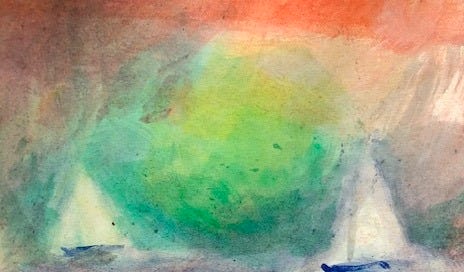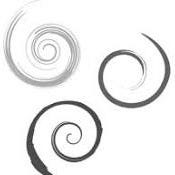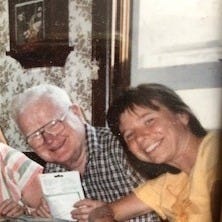The image of my father with his nose in a book remains vivid. Every night after supper, the newspapers were read, then he’d pick up a library book; his nose brushing the pages, he’d become absorbed in his favourite subject—the history of Scotland, England, and Ireland. My Dad’s eyesight had always been extremely bad. Even with thick glasses, he would eventually need a magnifying glass to read anything, but it didn’t seem to deter him. Oh, if only I had paid more attention to what riveted his attention night after night. He was probably a walking encyclopedia on the subjects that I am now so drawn to.
I’m recalling this as I make my way through Ken McGoogin’s 2019 book The Flight of the Highlanders: The Making of Canada. I can only read so much at a time because it’s causing such an uproar within. I’m emotionally undone as I read and resonate with what I’ve come to know, so late in life, as my own family history.
My sister Carolyn, a few years ago, went on a deep dive into our genealogy. Discovering forebearers that can be traced back to the 1600’s is astounding to someone who, until recently, could only name her immediate grandparents. And that with difficulty, as they all, but my one paternal grandmother, died before I was born.
Reading about the Battle of Culloden and the subsequent Highland Clearances, I feel I am burrowing down into very real people caught up in the drastic uprooting that brought untold numbers (200,000?) to this strange continent. Not as explorers, not as “settlers,” but as refugees.
Stephen Jenkinson writes eloquently about how so many of us in the West are “orphans”—cut off from our heritage, not having a long or intimate relationship with the “New World.” No wonder Western society seems perched on the surface of things, not quite landing, not quite home, and not even realizing it.
How could I not know of this history? I wasn’t an attentive history student, but still… I can only see it as another instance of when the trauma becomes so disruptive and dislocating that subsequent generations have no words to make sense of it. Or the story is filled with such shame and humiliation that no one wants to (or can) speak of it, hear it, remember it. All too soon, there’s no one to pass it down to—the language, the land, the times and the peoples have altered, trauma’s legacy.
Yet in learning more details and hearing more stories about what transpired only a few hundred years ago, it’s suddenly like I have a new, unexpected, surprising sense of belonging. This is me too: a scattered descendant of the resilient Cameron and MacMillan clan of survivors. Then an unfamiliar feeling bubbles up—being a particular “somebody” from a specific somewhere. A true Highlander trait is pride in one’s heritage, with a good dose of self-worth—maybe that’s it. The past still present, laying its claim upon me.
It would be easy to fall prey to a victim narrative. I can feel a sense of righteousness and indignation, wanting to blame the callous English redcoat armies who carried out such atrocities. But the victim/perpetrator cycle seems to be a perpetual merry-go-round, where we take turns being one or the other, intentionally, or unintentionally, as the case may be.
Moral superiority rings false pretty quickly with the next turn in history: in the “new” world,” the displaced Scottish Highlanders struggle to clear land, build log cabins, and farm in order to survive—but do so on the ancestral lands of another people on another continent, displacing them. How many of my ancestors were attentive to those ironies, the consequences of which continue to play out?
My nearly blind father with his nose in a book… What was he trying to see? Himself in the stories? What was the fascination? He would have grown up listening to his grandparents speaking Gaelic. Maybe something squeezed through when he was a wee laddie on his mother’s knee, absorbed in some Gaelic tale.
He didn’t know what my sister and I now know. All the names and places. How he would have loved the story of his great-great-great-great- grandparents John Cameron of Clunes and Lady Mary Cameron of Glen Nevis. How they boarded the ship Pearl in 1772 with nine of their eleven children, sailing to an unknown land. Somehow, something is being fulfilled in our knowing this now.
The past has found a way to reveal its ongoing self. A determined dandelion finding its way through a crack in the cement. What was buried eventually pokes through.
Saying their names is the least I can do, but even that is hard. There are times I’d rather avoid knowing too much. My body starts shaking, trembling takes over, as if something very old and dormant is being awakened. I need to take time and make space for this. And go slow. Otherwise, anxiety and avoidance take over. Is this why I spent much of yesterday curled up and staring out the window? The residue of ancient trauma?
I’m a little on thin ice sharing all this. But Dad is looking over my shoulder, keen on catching up on our story. I have to remember that uncovering the past, and integrating it, is a shared process, not an end point to be pounded into facts or catalogued into moral certitudes. A long view can afford mercy.
More on these themes are found in Nancy’s book, to be published by Inner Traditions, April 8th, 2025.
Pre-orders of The Call to the Far Shore: Carrying Our Loved Oneshrough Dying, Death, and Beyond are now available through your local bookstore, Amazon, and most major booksellers.
https://www.amazon.ca/Call-Far-Shore-Carrying-through/dp/B0D9TMVNL9
https://www.simonandschuster.com/books/The-Call-to-the-Far-Shore/Nancy-MacMillan/9798888501092
Nancy MacMillan is an expert observer of dying. The Call to the Far Shore is both remarkable and personal. Her Celtic colors shine through this book with wisdom and insight. For her and hers, death is a homecoming. —Diana Beresford-Kroeger Ph.d, author of To Speak for the Trees and Our Green Heart and creator of the documentary Call of the Forest







